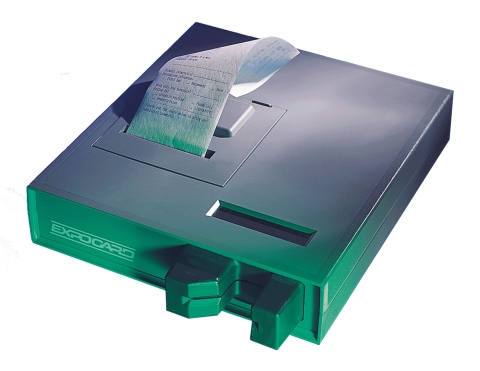Lead Retrieval Evolution: Birth and Eventual Demise of the Magstripe

In the past 23 years, as Galaxy evolved to modern-day Experient, Mike Godsey has not only seen the once omnipresent magstripe come to life, but also its demise, followed immediately by its evolution into what is being used today for lead retrieval on the showfloor.
When Galaxy first started in the event registration business 30 years ago, Godsey, who is Experient’s senior vice president of market development, said, “there used to be registration forms that were mailed in and one by one keyed into a rudimentary computer system.”
With the advent of computers came data collection, he added, “Show organizers thought, ‘Wow! This is wonderful!,’ as they started seeing reports that could quickly be run registration type or demographic codes.”
What that led to, Godsey said, was a need to facilitate the business relationship between the exhibitor and attendee. Lead retrieval was born by utilizing plastic embossed cards with contact information that had raised lettering. Exhibitors would literally place the card in old style credit card imprinters (the kind where you ask for your carbons back) and capture attendee data right in the booth.
Not long after, in the early 90’s, the next step was looking at getting all of the info collected easily into a database, and after a short time using computer chips in the cards, which were prohibitively expensive, Godsey said the magstripe was born.
“We could put everything you could imagine on there,” he added. “As the electronic age evolved, more and more info would fit on the magstripe card.”
In the booth, there was a desktop unit you could swipe the cards through, or a more “cumbersome” handheld model also in the beginning, Godsey said.
For more than a decade at Experient, the magstripe ruled on the showfloor as the primary tool for lead retrieval. “For quick leads being collected on the show floor, it was the best tool we had,” Godsey said.
In the mid 2000’s, the PDF417 barcode came along. With that code printing directly on the badge, exhibitors could easily access all attendee badge data electronically without the need for a separate card for the attendee to hold.
“This started to become the end of the magstripe card,” Godsey said. But, it still took a while for it to fade away for good. “We decided not to hang our hat on one technology or another – we offered both the magstripe and the barcode during that transition period,” he added.
Looking at where lead retrieval was headed next, there was a lot of talk in the past few years that it would eventually become obsolete with people just ‘bumping’ their personal cellphones and exchanging information directly.
“Three or four years ago, that used to keep me up at night,” Godsey said. “But, lead retrieval isn’t going anywhere. (The data being collected) needs to be uniform and consistent.”
Even so, most lead retrieval companies have kept up with the technological shift to the majority of attendees carrying smartphones. Experient, among others, now offers a tool that allows exhibitors to use their own personal devices to collect information.
“Instead of renting a device, people can use their own phone,” Godsey said. What isn’t being made in rental fees, he added, is now being made in software that is utilized to run the program on their personal devices.
Of the events in Experient’s portfolio, Godsey said about 25 percent now are using the lead retrieval software for the phones. “It’s never really been about the device,” Godsey said. “It’s about the data. Now, every, single person in the booth can collect leads ... on and off the show floor
He added other benefits of having lead retrieval right on the phone are each salesperson’s efforts in collecting leads can be tracked in real-time. “You can automatically see who has collected the most leads and have sales people following up immediately,” Godsey said.
He added that the technology being used to collect the information from the badge into the phone is QR code, which are more secure than a barcode on a badge - which contained all attendee data and could be easily compromised.
So, whatever happened to the magstripe? It hung in there for a long time. “It took a lot of years to finally get to the point where we weren’t using it at all anymore,” Godsey said. “(Just last year) was the last magstripe show.”
Even so, he added, they aren’t putting all of their eggs in the QR code basket either. “We’ll use whatever is the best (technology) that can read data in real-time,” he added.


Add new comment